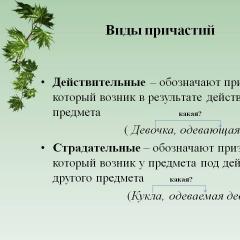Communion and exclusive adjective
In Russian, the Communion can switch to the exclusive adjective due to the weakening of the verb properties. In other words, the communion gradually loses the properties of temporary and acquires the quality constants. Accordingly, the spelling changes "NN" In communion and exclusive adjectives. It is important to know that in the communions is written twice. " nN ", in addition to words: intelligent, name, and in adjectives - one "N"except words: unexpected, neganded, unprecedented, desirable And others.
Properties of parts of speech
In order to distinguish the suffering communion and the ungalled adjective, you need to know their properties. Properties of communion and adjective:
Adjective is characterized by two more signs:
- It can enter a number of homogeneous members (pupil and shy).
- It may be figuratively (lost gaze).
Communion and exclusive adjective
The communion has its own specific affixes used for education. For example, the chloping is not a sacrament, because the verb "chlore" does not exist, unexpectedly - not the communion due to the fact that the words "causing" in the language does not happen. 
To distinguish between two categories you need:

Thus, if the word corresponds to at least one of the named items, it is communion, it means to write " nn "; If the word does not match any item, then these are ungalled adjectives (" n " and " nN " In what cases to write, we have already found out), you need to write one letter. If necessary, to determine the assay affiliation of the written word with two letters will be partition, with one - no.
Dependence on the semantic value
As for the suffixes of the analyzed parts of speech, the spelling of the exclusive adjectives should be noted. For example, words such as oil pancakes and oil paint. Here we distinguish between the communion and adjectives are not by rule, but in accordance with the meaning. In the first phrase, it is a separate adjective formed from the verb "oil", and in the second is an adjective formed from the noun "oil". And in phrases, for example, "oil-tires in the morning pancakes" oil - participle. In other words, when the word is used in the value "made of oil or working on oil" - Suffix is \u200b\u200bwritten in it. If in the meaning "impregnated with oil", then suffix - -n. 
The word wounded has a double writing. For example, in the proposal, "Stayed wounded, he began to make money on the campaign" in the word wounded - double "NN", although there is no console and there is no dependent word, formed from the verb to "wander" the imperfect species, the word will not ends with -Own, -Un. Doubts "NN" It is explained by the fact that the word carries the verb value, that is, denotes a temporary feature and is communion. The exclusive adjective does not indicate the action and answers the question: what? What?
Brief and full
The presence of one or two "N" The word depends on the form: full or brief. So, in brief adjectives spell so much "N"how much is complete. And in brief communities, only one is always written. "N". The girl was spoiled (spoiled - a brief adjective, denotes a permanent sign). Boys, probably, were spoiled by life (Spoiled - Communion, denotes a temporary sign).
The suffixes of the exclusive adjectives have their own characteristics. It should be added that in some combinations of repeating words, such as: latany-overwhelming, washed-processedDespite the prefixes of the second part of the combinations are written alone. The combinations are important and belong to the adjective.
Changes in lexical meaning
In cases where the communion turns into an adjective, it may change the lexical meaning. For example, the sacrament "forbidden" in the phrase "forgiven man" means "the person who forgave", but the adjective forgiveness for forgiveness "Forgive Sunday" acquires a different meaning and means the name of the day of the week before the big Orthodox post. 
Complex ungalled adjectives "H" and "NN" type: malosal, smooth whine, freshly populated, written with one "N". BUT: G. pipely, fresh, minorized Writing with doubles "N"Since the second part of these words is formed from verbs with consoles.
Nouns suffixes
Nouns formed from the communion of the suffering type and from the exclusive adjectives can be written with one "N", and with two "NN". It all depends on the basis of the word from which it is formed. For example, standard - from the adjective puttingbut producing verb to put a perfect species, so we write with two "NN". Ice cream - from the communion " ice cream"but, since the basis frost (What to do?) - imperfect species, then we write one "N". The same applies to the spelling of the derivatives of the dialect. 
Transition to adjective
If the communion goes into an adjective, then it adopts its signs:
A simple comparative degree is formed from it ( surprised, surprised).
It can be combined with words less or more ( less surprised).
He appears synonyms and antonyms from adjectives ( inspired mood, i.e Cheerful - Synonym, sad - Antonym).


